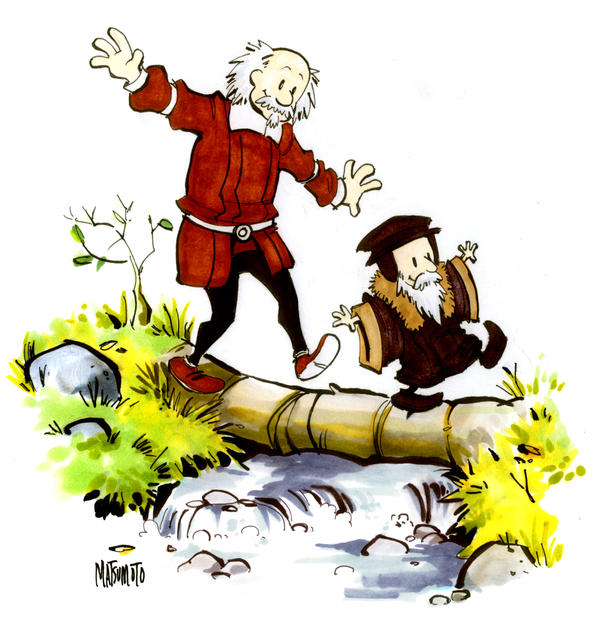==
Review these topics by revisiting the relevant texts:
1. Life in a state of nature would be _______, poor, nasty, brutish, and _____. (Fill in one blank for full credit.) LH 58
2. What was Hobbes' metaphorical image of the civilized state he thought people were driven by fear to prefer to a state of nature? LH 59
3. Hobbes was a _______, convinced that all aspects of existence including thinking are ______ activities. LH 60


4. The branch of philosophy concerned with what we can know and how we can know it is called _________. P 103
5. Like other skeptical arguments, the Illusion argument challenges our everyday belief, or common-sense ______. P 105
6. In a _____ dream, the dreamer is aware that he or she is dreaming. P 107.
==
1. Sarah Bakewell says 16th century French philosopher Michel de Montaigne was following whose example, when he retreated to his tower to write and reflect? PB 52
2. What was Montaigne's "near death experience," and what did it teach him? PB 53
3. What did Montaigne learn from the Epicureans? PB 54
OR,
Primary qualities, according to John Locke, include size, shape, and movement. What kind of qualities are color, smell, and taste? P 111
5. When Samuel Johnson kicked a stone and said "I refute it thus," what view (or whose) was he trying to refute? P 116
6. The view that physical objects are just patterns of actual or possible sense experiences is called what? P 117
==
1. What state of mind, belief, or knowledge was Descartes' Method of Doubt supposed to establish? OR, What did Descartes seek that Pyrrho spurned? LH 63, 64
2. Did Descartes claim to know (at the outset of his "meditations") that he was not dreaming? LH 65
3. What strange and mythic specter did Gilbert Ryle compare to Descartes' dualism of mind and body? ("The ____ in the ______.") LH
4. Historically, scientific observation and tests replaced "truth by ______" as exemplified by Aristotle and the Church. P 121
5. An argument whose conclusion must be true if its premises are true is called _______. (inductive, deductive, abductive) P125
6. _______ is Karl Popper's view that science and knowledge progress by conjecture and refutation rather than proof, and that a theory which cannot in principle be falsified is unscientific; Thomas Kuhn said science progresses by _______ shifts. P 131, 135
==
1. Spinoza's view, that God and nature (or the universe) are the same thing, is called _______. LH 76
2. Spinoza was a determinist, holding that _____ is an illusion. LH 79
3. Susan James says Spinoza's "main claim" is that we're always striving to make ourselves more ____. PB 73
4. Anglo-Austrian philosopher ________'s "family resemblance" view implies that there's no single quality held in common by all art. P 159
5. The view that something is art just because it's exhibited in an art gallery fails to distinguish good art from bad, according to one criticism of which theory? P 164
6. The trouble with art forgeries is their attempt to ______. P 174
==
1. According to John Locke, all our knowledge comes from _____; hence, the mind of a newborn is a ______. (fill in one for full credit, take a bonus credit if you got them both) LH 82

2. Locke said _____ continuity establishes personal identity (bodily, psychological); Thomas Reid said identity relies on ______ memories, not total recall. LH 85-6
3. Bishop George Berkeley was a metaphysical idealist because he believed all that exist are____; he was an immaterialist because he denied that ______ exists; he was an _______ because he said all knowledge comes from experience. LH 88, 90
4. Esse est percipi means what?
5. According to Dunn, Locke ______ (supported, opposed, invented) religious toleration and the separation of church and state? PB 85
6. (T/F) Campbell disagrees with Locke about the independent existence of secondary qualities like sound and color. PB 95
==
1. What English poet declared that "whatever is, is right"? LH 93
2. What German philosopher, with his "Principle of Sufficient Reason," agreed with the poet?
3. What French champion of free speech and religious toleration wrote a satirical novel/play ridiculing the idea that everything is awesome? 94-5
4. What 1755 catastrophe deeply influenced Voltaire's philosophy? 96
5. What did Voltaire mean by "cultivating our garden"? 97
6. Was Voltaire an atheist? 98
[Thanks for working on a draft study guide, Evan. I published this before noticing it. But give yourself a couple of bonus runs for the effort.]
No comments:
Post a Comment
Note: Only a member of this blog may post a comment.